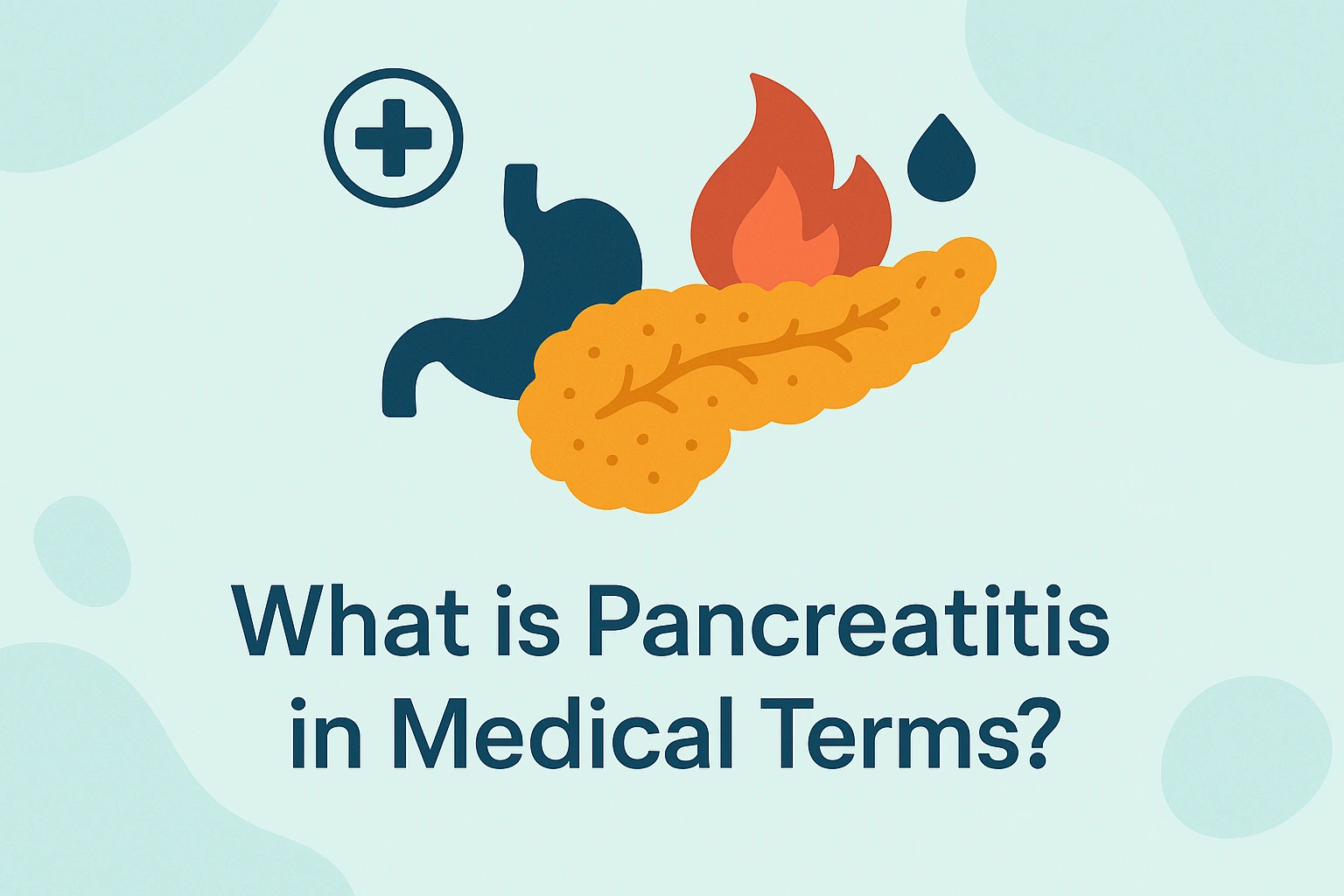Pancreatitis is an inflammation of the pancreas, a gland located behind the stomach that plays a key role in digestion and blood sugar regulation. The pancreas produces digestive enzymes that help break down food and insulin, which helps regulate blood sugar levels. When the pancreas becomes inflamed, it can cause severe abdominal pain and lead to complications such as digestive issues, infection, and organ failure. Pancreatitis can occur as an acute condition (sudden and severe) or as a chronic condition (long-term inflammation).

Types of Pancreatitis
There are two types of Pancreatitis:
- Acute Pancreatitis: A sudden inflammation of the pancreas that can develop quickly, often due to factors like gallstones or alcohol consumption. It can range from mild to severe and may resolve with proper treatment. However, in some cases, it can lead to life-threatening complications, such as organ failure or infection.
- Chronic Pancreatitis: Long-term inflammation of the pancreas, often caused by repeated episodes of acute pancreatitis. Chronic pancreatitis can lead to permanent damage to the pancreas, impairing its ability to function properly, particularly its ability to produce digestive enzymes and insulin. Over time, this can lead to malabsorption, diabetes, and persistent abdominal pain.
Causes and Risk Factors of Pancreatitis
The primary causes of pancreatitis are linked to damage or irritation of the pancreas. Common causes and risk factors include:
- Gallstones: Gallstones can block the bile duct, which can lead to the backup of digestive enzymes into the pancreas, causing inflammation.
- Excessive alcohol consumption: Chronic alcohol use is one of the leading causes of both acute and chronic pancreatitis. It can cause direct damage to the pancreas and disrupt normal enzyme production.
- High triglycerides: Elevated levels of fatty substances (triglycerides) in the blood can lead to pancreatitis.
- Medications: Certain medications, including diuretics, antibiotics, and immunosuppressants, can trigger pancreatitis.
- Infections: In rare cases, infections, such as mumps or hepatitis, can lead to pancreatitis.
- Trauma or surgery: Physical injury to the pancreas or surgery in the abdominal area can increase the risk of developing pancreatitis.
- Genetics: Some genetic disorders, such as cystic fibrosis or familial pancreatitis, can predispose individuals to pancreatitis.
- Autoimmune conditions: The body’s immune system attacking the pancreas can cause autoimmune pancreatitis, a rare form of the disease.
Symptoms of Pancreatitis
The symptoms of pancreatitis can vary based on whether the condition is acute or chronic:
Acute Pancreatitis: The most common symptoms include:
- Severe abdominal pain, often in the upper abdomen, which may radiate to the back.
- Nausea and vomiting.
- Fever and increased heart rate.
- Tenderness in the abdomen.
- Bloating and a feeling of fullness.
- Jaundice (yellowing of the skin and eyes) in some cases.
Chronic Pancreatitis: Symptoms include:
- Persistent or recurrent abdominal pain.
- Malabsorption and unexplained weight loss due to a decrease in the production of digestive enzymes.
- Steatorrhea (fatty stools), which can occur when the pancreas is unable to properly digest fats.
- Diabetes due to damage to insulin-producing cells in the pancreas.
Diagnosis and Treatment of Pancreatitis
Diagnosing pancreatitis involves a combination of medical history, physical examination, and diagnostic tests, including:
- Blood tests: Elevated levels of amylase and lipase, digestive enzymes produced by the pancreas, indicate pancreatitis.
- Imaging tests: CT scans, ultrasound, or MRI can help detect inflammation, fluid collections, or pancreatic tissue damage.
- Endoscopic ultrasound (EUS): Used to visualize the pancreas and detect conditions like gallstones or pancreatic tumors.
Treatment for pancreatitis varies depending on the severity and type:
- Hospitalization: Acute pancreatitis often requires hospitalization for fluid replacement, pain management, and monitoring of complications.
- Fasting: Patients are typically advised to avoid eating for a few days to give the pancreas time to heal.
- Pain management: Pain relief is an important part of treatment, often requiring narcotic analgesics in severe cases.
- Antibiotics: In cases of infection or pancreatic abscess.
- Surgery: In severe cases of acute pancreatitis, surgery may be required to remove gallstones, drain fluid collections, or treat complications like necrosis.
- Enzyme replacement therapy: For chronic pancreatitis, patients may need to take pancreatic enzyme supplements to aid digestion.
- Insulin therapy: If the pancreas loses its ability to produce insulin, diabetes management is necessary.
Prevention and Management of Pancreatitis
While some causes of pancreatitis cannot be prevented, there are steps that can help reduce the risk of developing the condition:
- Limit alcohol consumption: Reducing or eliminating alcohol intake can significantly reduce the risk of pancreatitis.
- Maintain a healthy diet: Eating a balanced, low-fat diet can help prevent high triglyceride levels and reduce the burden on the pancreas.
- Manage underlying conditions: Treating high cholesterol, diabetes, and other health issues can reduce the risk of pancreatitis.
- Avoid smoking: Smoking is a major risk factor for pancreatitis and pancreatic cancer.
- Regular monitoring: Individuals with chronic pancreatitis or a history of pancreatitis should be regularly monitored for complications like diabetes or pancreatic insufficiency.
When to Seek Medical Help for Pancreatitis?
If you experience severe abdominal pain, nausea, vomiting, or fever, it is important to seek medical attention immediately. Acute pancreatitis can develop rapidly and requires urgent treatment to prevent serious complications like organ failure or infection.
Related Terms to Pancreatitis
FAQs for Pancreatitis
When should I go to the ER for pancreatitis?
If you experience severe abdominal pain, fainting, or confusion, seek emergency care immediately.
How can heat and dehydration affect pancreatitis?
In hot climates, dehydration can exacerbate symptoms; ensure adequate hydration, especially during long-haul travel.
What are some ways to reduce the risk of pancreatitis?
Maintaining a balanced diet and moderating alcohol intake can help lower risk factors.
